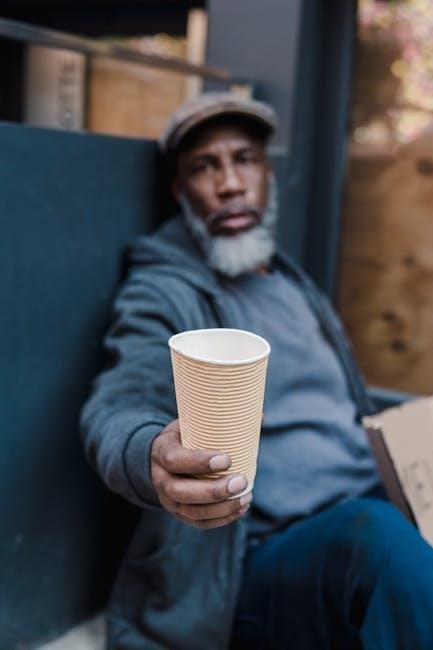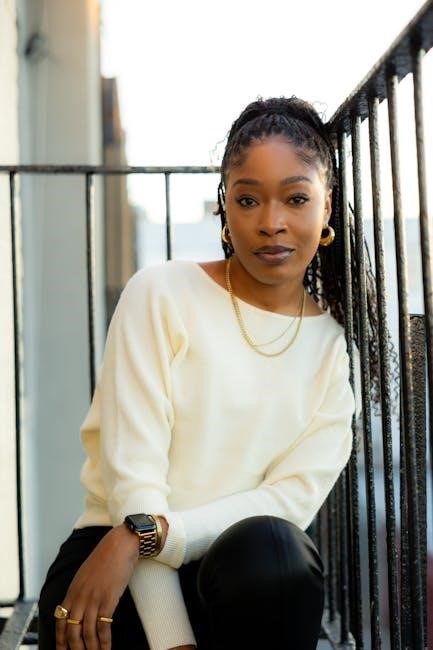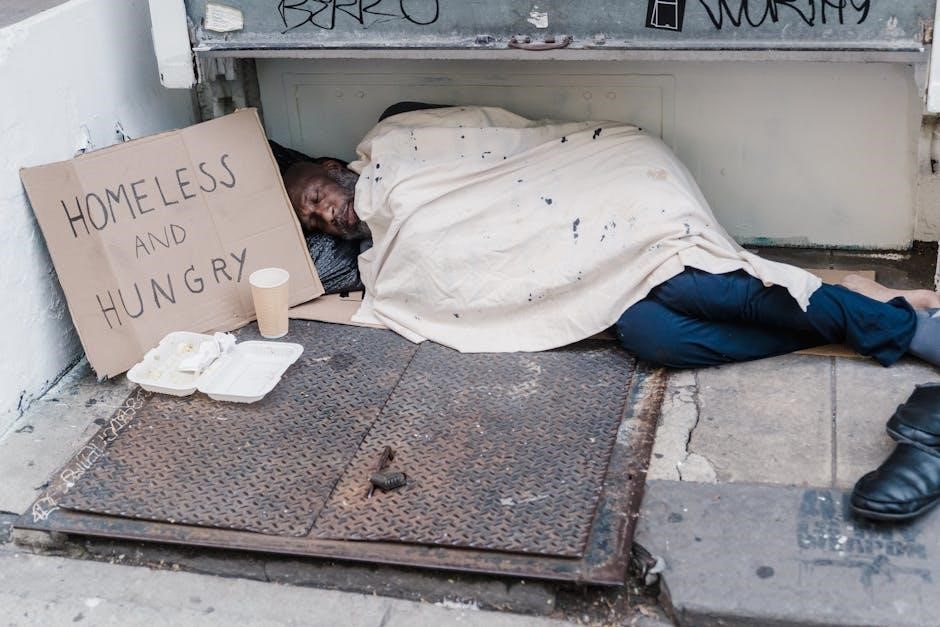Cathy J․ Cohen’s essay explores the radical potential of queer politics through the lens of punks‚ bulldaggers‚ and welfare queens‚ highlighting their marginalized positions and resistance․
Overview of the Topic
Cathy J․ Cohen’s essay‚ Punks‚ Bulldaggers‚ and Welfare Queens: The Radical Potential of Queer Politics?‚ examines the intersections of race‚ class‚ gender‚ and sexuality through the experiences of marginalized groups․ These groups—punks‚ bulldaggers‚ and welfare queens—represent nonnormative identities often excluded from mainstream queer politics․ Cohen argues that their marginalization offers a radical potential for challenging oppressive systems․ By centering these voices‚ the essay critiques exclusionary practices within queer movements and explores how intersectional frameworks can foster progressive political change․ The work bridges theory and activism‚ emphasizing the importance of solidarity among marginalized communities to achieve transformative social justice․
Importance of the Study
Cathy J․ Cohen’s essay is a seminal work in queer studies‚ offering a critical analysis of how marginalized groups like punks‚ bulldaggers‚ and welfare queens challenge dominant narratives․ By focusing on their exclusion from both mainstream society and queer movements‚ the study highlights the urgent need for intersectional frameworks․ It emphasizes the transformative potential of centering these voices in political activism and academic discourse․ The essay’s exploration of race‚ class‚ gender‚ and sexuality provides a foundation for understanding systemic oppression and fostering solidarity․ Its insights remain relevant today‚ influencing contemporary discussions on social justice‚ identity‚ and radical political change․
Historical Context
The historical context of punks‚ bulldaggers‚ and welfare queens reveals their origins in marginalized communities‚ evolving identities‚ and cultural impact‚ significantly shaping queer and radical politics․
Background of the Groups
The punks‚ bulldaggers‚ and welfare queens emerge from distinct yet interconnected marginalizations․ Punks represent a countercultural rebellion against societal norms‚ while bulldaggers‚ often associated with Black queer women‚ embody resistance to gender and racial oppression․ Welfare queens‚ a term rooted in racialized stereotypes‚ symbolize the intersection of poverty and systemic exclusion․ These groups‚ though differing in context‚ share a common experience of marginalization‚ which Cathy J․ Cohen argues can form the basis for a unified radical politics․ Their histories reflect the complexities of identity‚ oppression‚ and resilience‚ shaping their roles in queer and social justice movements․
Evolution of the Terminology
The terms punks‚ bulldaggers‚ and welfare queens have evolved significantly over time‚ reflecting shifting societal attitudes and political contexts․ Originally derogatory‚ these labels were reclaimed by marginalized communities to assert identity and challenge oppression․ The term “punk” emerged in the 1970s‚ associated with countercultural movements‚ while “bulldagger” originated in early 20th-century African American communities to describe masculine-presenting women․ “Welfare queen” was popularized in the 1980s as a racist and sexist trope․ Cathy J․ Cohen’s work highlights how these terms‚ once tools of exclusion‚ have been transformed into symbols of resistance and solidarity‚ underscoring their radical potential in queer politics and social justice․

Punks
Punks embody a rebellious identity‚ challenging societal norms through nonconformity and resistance‚ while facing marginalization and systemic exclusion‚ yet fostering cultural and political transformation․
The Societal Role of Punks
Punks play a crucial role in challenging societal norms and institutions‚ embodying resistance through their nonconformity․ Their visibility disrupts hegemonic structures‚ fostering dialogue on inequality and exclusion․ By occupying marginal spaces‚ punks highlight systemic injustices faced by queer and marginalized communities․ Their radical presence encourages collective action and solidarity‚ transforming individual struggles into political movements․ Despite facing stigma‚ punks serve as catalysts for social change‚ inspiring others to question oppressive systems and reclaim their identities․ Their role underscores the importance of visibility and resistance in dismantling structures of oppression‚ making them integral to queer political discourse and activism․
Challenges Faced by Punks
Punks face significant societal rejection due to their nonconformity‚ often leading to marginalization and exclusion․ Their resistance to norms results in stigma and discrimination‚ perpetuating their outsider status․ Economic exclusion further exacerbates their struggles‚ as systemic barriers limit access to resources and opportunities․ Political marginalization also hinders their ability to influence change‚ as their radical perspectives are frequently dismissed․ Additionally‚ punks confront internal community pressures‚ as their identities and activism are sometimes criticized within queer spaces․ These challenges highlight the resilience required to maintain their resistance and advocate for transformative change‚ emphasizing the need for solidarity and recognition of their struggles․
Cultural Impact of Punks
Punks have had a profound cultural impact by challenging societal norms and embracing nonconformity․ Their visibility and activism inspire broader movements for social change‚ particularly within queer communities․ By rejecting mainstream expectations‚ punks create spaces for radical expression and resistance․ Their influence extends beyond aesthetics‚ fostering solidarity among marginalized groups and advocating for progressive politics․ Punks’ cultural significance lies in their ability to disrupt status quo narratives‚ promoting intersectional perspectives that address race‚ class‚ and gender․ Their radical potential‚ as highlighted in Cohen’s work‚ underscores their role in reshaping cultural and political landscapes‚ making them a pivotal force for transformative change and queer empowerment․
Bulldaggers
Bulldaggers‚ often associated with black lesbian communities‚ represent a marginalized yet resilient group‚ challenging societal norms and resisting intersectional oppression through their radical presence and activism․
The Role of Bulldaggers in Queer History
Bulldaggers‚ often associated with black lesbian communities‚ have played a significant role in queer history by challenging societal norms and resisting intersectional oppression․ Their radical presence has been a testament to resilience and defiance․ Bulldaggers‚ alongside punks and welfare queens‚ embody the nonnormative and marginal positions that Cathy J․ Cohen highlights as the basis for progressive queer politics․ By rejecting heteronormative and cisnormative expectations‚ bulldaggers have carved out spaces of resistance and visibility‚ particularly within black queer communities․ Their history underscores the importance of intersectionality‚ linking race‚ class‚ and sexuality in struggles for liberation․ This group’s legacy continues to inspire contemporary activism and cultural representation․
Struggles and Marginalization

Bulldaggers‚ as a marginalized group within already marginalized communities‚ have faced profound struggles rooted in race‚ class‚ and sexuality․ Their nonconformity to societal norms often led to exclusion from mainstream LGBTQ+ movements‚ which historically centered on white‚ middle-class experiences; Bulldaggers endured systemic oppression‚ including economic disparities and cultural erasure‚ further entrenching their marginalization․ Their visibility and defiance‚ however‚ also became a source of resilience and resistance․ The struggles of bulldaggers highlight the intersectional nature of oppression and the need for queer politics that address these overlapping forms of exclusion․ Their experiences underscore the radical potential of challenging dominant structures and reclaiming identity within queer communities․
Community and Identity
Bulldaggers have historically navigated complex identity formation‚ often existing at the intersections of race‚ class‚ and sexuality․ Their identity is deeply tied to resilience and self-definition‚ as they resist societal norms and expectations․ Despite marginalization‚ bulldaggers have fostered strong community ties‚ often finding solidarity in shared experiences of exclusion․ Their identity is not defined by mainstream acceptance but by their ability to create spaces of authenticity and belonging․ The struggle for recognition within queer communities highlights their unique role in challenging rigid categorizations; Through their resilience‚ bulldaggers exemplify the power of redefining identity on their own terms‚ fostering a sense of pride and collective strength․
Welfare Queens
Welfare Queens are often stereotyped and marginalized‚ facing economic and social exclusion․ Their experiences highlight systemic oppression and resistance‚ embodying the intersections of race‚ class‚ and gender in queer politics․

Stereotyping and Misrepresentation
The term “Welfare Queens” has been weaponized to perpetuate harmful stereotypes‚ portraying low-income women of color as abusing the welfare system․ These narratives‚ deeply rooted in racism and misogyny‚ ignore the structural inequalities that force many into poverty․ Media and political rhetoric often sensationalize their stories‚ reinforcing false notions of laziness and fraud․ This misrepresentation not only stigmatizes individuals but also justifies policies that further marginalize vulnerable communities․ By reducing complex issues to simplistic stereotypes‚ society overlooks the systemic barriers faced by these women‚ perpetuating cycles of poverty and exclusion․ Their voices and struggles remain largely invisible in mainstream discourse;
Economic and Social Marginalization
Welfare Queens‚ as a marginalized group‚ face systemic exclusion from economic opportunities‚ perpetuating cycles of poverty․ Their identities‚ often marked by race‚ gender‚ and sexuality‚ lead to social exclusion and limited access to resources․ Public assistance‚ meant to provide support‚ is frequently denied or stigmatized‚ further entrenching their marginalization․ The intersection of racism‚ sexism‚ and classism intensifies their economic struggles‚ as they are disproportionately affected by unemployment and underemployment․ This marginalization is compounded by societal norms that criminalize poverty‚ reinforcing their exclusion from mainstream economic and social systems․ Addressing these inequalities requires challenging the structural barriers that perpetuate their economic and social marginalization․
Political and Cultural Impact
The Welfare Queens narrative has been weaponized politically to dismantle social safety nets‚ perpetuating harmful stereotypes about Black women and poverty․ Culturally‚ this image reinforces racial and gender biases‚ shaping public perception and policy․ By challenging these narratives‚ marginalized groups can reclaim their voices and advocate for systemic change․ This resistance fosters solidarity among queer communities‚ amplifying their political influence and cultural presence․ The intersection of race‚ class‚ and gender in this context underscores the need for inclusive policies and representation․ By addressing these issues‚ the political and cultural impact of Welfare Queens can be transformed into a force for progressive change and empowerment․

Radical Potential
Marginalized groups like punks‚ bulldaggers‚ and welfare queens embody radical potential by challenging norms and inspiring transformative change through their resistance and intersectional perspectives․
Overview of Radical Politics
Cathy Cohen’s work introduces radical politics as a framework for transformative change‚ emphasizing the role of marginalized groups like punks‚ bulldaggers‚ and welfare queens․ These groups‚ often excluded from mainstream political discourse‚ embody radical potential by challenging societal norms and structures․ Cohen argues that their nonnormative positions offer a basis for progressive politics‚ highlighting the importance of intersectionality and coalitions․ By centering their experiences‚ radical politics seeks to dismantle systems of oppression and create inclusive spaces for marginalized voices․ This approach advocates for systemic change‚ urging solidarity among diverse groups to address shared struggles and foster collective empowerment․
Strategies for Progressive Change
Cohen emphasizes that radical politics requires strategic actions to dismantle oppressive systems․ Building coalitions among marginalized groups is crucial‚ as their shared experiences can foster collective resistance․ Amplifying the voices of punks‚ bulldaggers‚ and welfare queens ensures their narratives challenge dominant discourse․ Advocating for policy reforms that address systemic inequalities is another key strategy․ By centering intersectionality‚ radical politics can bridge divides across race‚ class‚ and gender․ These strategies aim to create inclusive spaces for marginalized communities‚ promoting a more equitable society․ Ultimately‚ Cohen’s framework calls for continuous activism and solidarity to achieve transformative change․

Intersectionality
Intersectionality examines how race‚ class‚ and gender intersect‚ shaping experiences of marginalization․ Cohen’s work highlights these intersections within queer communities‚ emphasizing overlapping oppressions․
Race‚ Class‚ and Gender
Race‚ class‚ and gender are central to understanding the marginalization of punks‚ bulldaggers‚ and welfare queens․ These identities often intersect‚ creating unique experiences of oppression․ For instance‚ black queer individuals face both racial and sexual exclusion‚ while welfare queens are stereotyped based on race and socioeconomic status․ Cohen’s work emphasizes how these intersections amplify marginalization‚ highlighting the need for a politics that addresses these overlapping systems of oppression․ By examining these intersections‚ we can better understand how to build solidarity and create inclusive political movements that account for diverse experiences․
Solidarity Among Marginalized Groups
Solidarity among marginalized groups is essential to fostering collective resistance and transformative change․ Cohen’s work highlights how punks‚ bulldaggers‚ and welfare queens‚ though distinct‚ share experiences of marginalization․ By recognizing common struggles‚ these groups can unite to challenge oppressive systems․ Intersectional solidarity allows for the creation of inclusive political movements that address the unique and shared challenges faced by each group․ Building alliances across race‚ class‚ and gender lines strengthens the ability to resist systemic oppression and advocate for justice․ Such solidarity is crucial for achieving progressive social change and creating a more equitable society․
Challenges and Criticisms
The groups face internal conflicts over identity and strategy‚ while externally‚ societal discrimination and political backlash critique their radical approaches to social change․
Internal Conflicts
Internal conflicts arise from differing views on identity‚ political strategies‚ and representation․ The diversity within these groups often leads to disagreements about how to address their marginalization․ While some advocate for radical‚ confrontational approaches‚ others prefer more moderate methods‚ causing fragmentation․ Additionally‚ debates over who represents the community and how to define their collective identity further complicate unity․ These conflicts stem from their nonnormative positions‚ as highlighted by Cohen‚ and reflect the challenges of uniting diverse voices under a shared political agenda․ Such divisions can hinder their ability to achieve progressive change‚ underscoring the need for internal dialogue and solidarity․
External Opposition
The groups face external opposition rooted in societal structures and political systems that perpetuate their marginalization․ Systemic barriers‚ such as racial‚ class‚ and gender biases‚ contribute to their exclusion․ External forces often dismiss their radical politics as threats to mainstream norms‚ leading to further repression․ Political rhetoric and media narratives frequently dehumanize these groups‚ reinforcing stereotypes and justifying their exclusion․ This opposition is deeply intertwined with historical and contemporary power dynamics‚ ensuring their voices remain marginalized․ Such external challenges highlight the need for solidarity and resistance to dismantle oppressive systems that perpetuate their exclusion and denial of rights․ Their struggles are deeply embedded in broader societal inequalities․

Modern Relevance
The radical politics discussed in Cohen’s essay remain relevant today‚ inspiring contemporary queer activism and challenging systemic inequalities through intersectional lenses and grassroots movements worldwide․
Contemporary Activism
Cathy Cohen’s radical vision continues to inspire modern activism‚ particularly among marginalized queer communities․ Contemporary activists draw on her ideas to challenge systemic inequalities and promote intersectional justice․ By centering the experiences of punks‚ bulldaggers‚ and welfare queens‚ today’s movements emphasize resistance and solidarity․ Grassroots organizations are using Cohen’s framework to address issues like racial justice‚ economic disparity‚ and gender identity․ This approach fosters coalition-building across marginalized groups‚ creating a powerful force for progressive change․ The essay’s themes resonate strongly in today’s political climate‚ urging activists to embrace radical politics as a means of dismantling oppressive systems and reclaiming power for queer communities;

Cultural Representation
Cultural representation of punks‚ bulldaggers‚ and welfare queens remains complex‚ often marked by marginalization and stereotyping․ Media and popular culture frequently perpetuate negative portrayals‚ reinforcing societal stigma․ However‚ there is a growing movement to reclaim and redefine these identities through art‚ literature‚ and film․ By amplifying their stories‚ marginalized communities challenge dominant narratives and assert their visibility․ Cohen’s essay underscores the importance of cultural representation in shaping queer politics‚ urging a shift from exclusion to inclusion․ This shift is vital for fostering understanding and solidarity‚ enabling these groups to reclaim their cultural spaces and narratives․ Their stories are integral to a more inclusive and equitable society․
Cathy Cohen’s essay underscores the radical potential of marginalized groups‚ emphasizing their role in challenging societal norms and advocating for transformative political and cultural change․
Cathy J․ Cohen’s essay explores the radical potential of queer politics through the marginalized groups of punks‚ bulldaggers‚ and welfare queens․ These groups‚ often excluded from mainstream discourse‚ embody nonnormative identities that challenge societal norms․ Cohen argues that their marginalization stems from intersecting race‚ class‚ and gender oppressions․ By centering these groups‚ Cohen advocates for a politics rooted in solidarity and resistance․ The essay highlights internal conflicts within queer movements and external opposition from dominant structures․ Ultimately‚ Cohen’s work emphasizes the transformative power of radical queer politics in addressing systemic inequalities and fostering progressive change․ Her arguments remain relevant in contemporary discussions of intersectionality and social justice․
Future Directions
Future directions involve expanding the radical potential of queer politics by amplifying the voices of punks‚ bulldaggers‚ and welfare queens․ Solidarity across marginalized groups must be strengthened to address intersecting oppressions․ Integrating these perspectives into mainstream social justice movements can foster broader systemic change․ Education and advocacy are crucial to challenge stereotypes and promote inclusivity․ Cultural representation and media must reflect the diversity of queer experiences․ Additionally‚ addressing economic and social inequalities through policy reform is essential․ By centering these groups‚ future activism can build on Cohen’s framework to create a more equitable society‚ ensuring their radical politics continue to inspire transformative change․ Their stories and struggles remain vital in contemporary queer movements․
